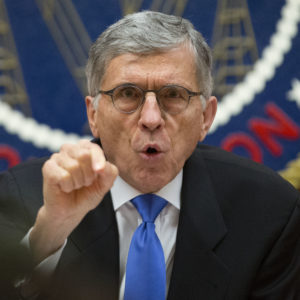The Federal Communications Commission is relying on faulty data to justify its plan to get rid of set-top box rentals, according to one economist, who says the amount cable and satellite customers pay is “almost half” of what the agency claims.
Later this month the FCC will vote on a plan to make pay-TV providers offer their content on apps instead of forcing consumers to rent set-top boxes — fees the agency claims cost the average U.S. household $231 every year, totaling an almost $20 billion annual profit for the cable and satellite industries.
According to economist George Ford of the Phoenix Center, a non-profit D.C.-based policy think-tank, that amount — calculated by neither an FCC or Obama administration study, but by a year-old congressional informal survey — is “grossly” overstated by as much as 60 percent.
The survey of the 10 leading pay-TV providers, conducted last July by the offices of Democratic Sens. Ed Markey of Massachusetts and Richard Blumenthal of Connecticut “provides no details as to how their figures are calculated” according to Ford, and didn’t take into account different options like DVR, promotions or the range of prices providers offer.
AT&T and DISH provide customers with one free box, for example, with the former charging $8 for the second, down from the survey’s purported $7.43 per box every month to $4.92 for the survey claimed average of 2.6 boxes per home. DISH prices are even less at $4.20 — an overestimation of more than 60 percent. Comcast, the largest cable provider in the U.S. with 22.4 million subscribers, charges $2.20 to 2.50 per box, while Cox — serving 2.9 million — charges $8.50. The average price of the two comes to $5.43, and the subscriber-weighted average between the two, $3.05.
Ford said the 2.6 average itself is problematic, since the survey assumes the number is the same across all providers. Data from providers themselves says otherwise, with Bright House Networks, for example, reporting 3.8 million boxes divided across 2.4 million subscribers, averaging 1.6 boxes per subscriber. By applying the 2.6 figure, Markey and Blumenthal exaggerated the number of boxes Bright House customers rent by 60 percent.
Neither DISH nor Verizon included the average number of boxes per household, while DirecTV — a rival satellite provider — reported 2.5. The average of Verizon’s terrestrial competitors was 2.2. By using the midpoints of the various price ranges offered by providers like Comcast and Time Warner Cable and plugging in data not offered by providers with numbers from similar competitors, Ford used subscriber-weighted averages to find a wide range of subscriber fees, with Comcast customers paying an average of $76.14 every year for 2.7 boxes on the low end, and Cablevision subscribers paying $237.37 for 2.8 boxes on the high end.
“Most importantly, across all 10 providers in the survey, the average annual fees paid for all boxes in the subscriber’s home is $145,” Ford wrote. “The average monthly cost per box is $5.15. These averages are well below those reported by Blumenthal and Markey ($7.43 per box and $231 per year). Blumenthal and Markey, grossly overstate — by 60 percent — the fees related to set-top boxes.”
Based on Ford’s figures, “the annual expenditures of the U.S. consumer on set-top boxes equals about $12 billion, almost half of the $20 billion claimed by Blumenthal and Markey.”
The number was thrown around repeatedly in the Senate Thursday during an FCC oversight hearing. Republican lawmakers grilled FCC Chairman Tom Wheeler on the latest version of his plan to unlock the box, which includes a provision to give the FCC authority over licensing agreements between pay-TV providers and the third-party devices that will download their apps.
Providers and Republicans in the Senate and on the commission aren’t happy with the provision, and one of Wheeler’s two fellow Democratic commissioners — the two he counts on to pass his proposals when the FCC’s two Republican commissioners are opposed — appears ready to defect.
Commissioner Jessica Rosenworcel, who has had her renomination hearing stalled in the Senate over Wheeler’s partisan voting record and unwillingness to definitively say he’ll leave office with Obama in January — said she isn’t sure the FCC has the authority to oversee copyright.
“I’m going to be very candid with you that I have some problems with licensing and the FCC getting a little bit too involved with the licensing scheme here,” Rosenworcel said. “Because when I look at the Communications Act and Section 629, I just don’t think we have the authority.”
Section 629 instructs the FCC to promote competition in the TV navigation device marketplace, and has been cited by Wheeler as his primary justification for the rules change. Without Rosenworcel, it’s unlikely Wheeler will get the votes needed to pass the proposal during the commission’s open meeting on Sept. 29.
Wheeler said “the door isn’t closed” on the proposal, and said commissioners still have two weeks to compromise.

